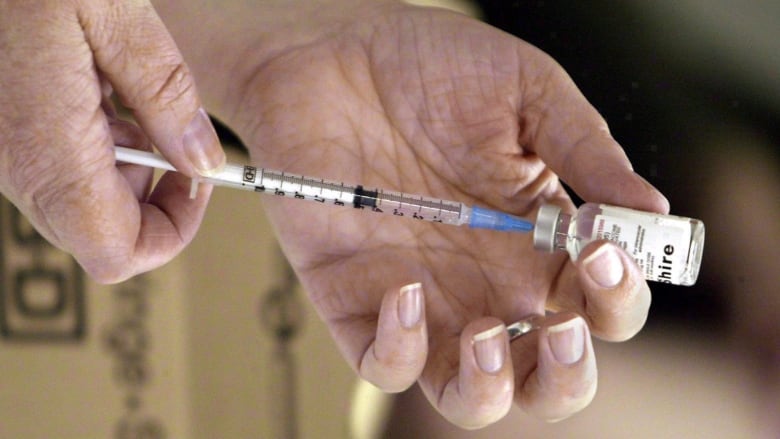Vaccinations should be mandatory, U of A professor says
'It's very difficult to counter a message coming from people who control popular culture'

A University of Alberta professor believes vaccinations should be mandatory.
"You may not agree with the fact that you should wear a seatbelt, or you should stop at a red light, but because it's the law, you're inclined to follow it," said Ubaka Ogbogu, assistant professor in the Faculty of Law and Faculty of Pharmacy.
"I think we need to adopt the same kind of thinking with respect to vaccination."
- David Swann pushes for 'mandatory choice' vaccines
- Vaccine debate focuses on disclosure in Alberta schools
- Mandatory childhood vaccinations supported by majority in B.C. and Alberta: poll

Organizers of the event acknowledged that the medical and scientific community has done a poor job explaining to the public how and why vaccines work leading to online campaigns against them.
"I don't think governments are set up to actually, effectively counter these messages, most of which come from persons who are quite influential, like movie stars, Hollywood actors," he said.
"It's very difficult to counter a message coming from people who control popular culture in that way."
Reality starand television host Jenny McCarthy became asfamous for championing of the flawedidea that vaccines give children autism, as her Playmate status. Her anti-vaccination endorsement was based on a single study since discredited.
A recent study suggests measles, a disease that was considered eliminated 16 years ago in the U.S., made a comeback in which a "substantial proportion" of cases wereassociated with vaccine refusal.
The goal of the event hosted by the Public Science Institute at the University of Alberta was to begin taking the vaccination discussion away from the internet and into the classroom.
"We've probably made assumptions as educators and health care people that just because we say something is the way it should be that the general public will necessarily accept our advice," said David Evans, virologist and vice-dean at the Faculty of Medicine.
Evans said he and his colleagues need to do a better job talking about how vaccines work, and about their value historically.
"If we don't constantly maintain our vigilance to ensure that the public is protected by these vaccines, what you will see is what happens when vaccine coverage starts to drop, which is diseases start to come back."












_(720p).jpg)


 OFFICIAL HD MUSIC VIDEO.jpg)
.jpg)



























































































